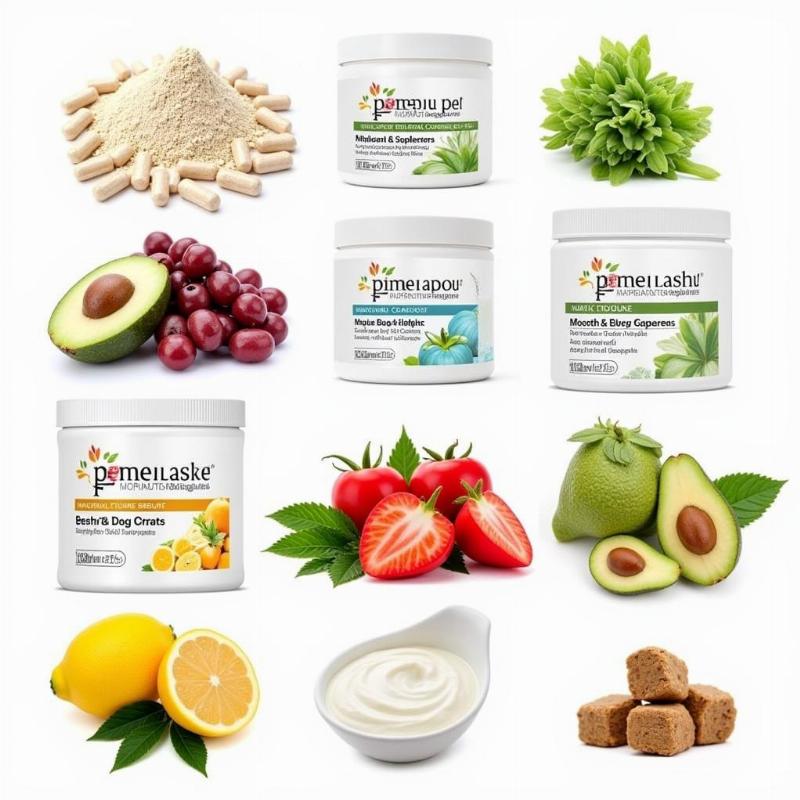Allergies can make your furry friend miserable, leading to itchy skin, digestive upset, and more. While conventional medications can help, many pet owners are turning to natural probiotics for dogs with allergies as a complementary therapy. Could this be the right approach for your dog? Let’s explore the potential benefits and how to choose the best natural probiotic for your allergic pup.
Understanding Allergies in Dogs
Just like humans, dogs can develop allergies to various substances, including pollen, dust mites, certain foods, and even flea bites. These allergens trigger an immune response, leading to inflammation and a cascade of uncomfortable symptoms. Common signs of allergies in dogs include excessive scratching, licking, chewing at their paws, skin redness, ear infections, and gastrointestinal issues. If you suspect your dog has allergies, a visit to your veterinarian is crucial for proper diagnosis and treatment.
The Role of Probiotics in Allergy Management
Probiotics are live microorganisms that, when administered in adequate amounts, confer a health benefit on the host. They primarily work by balancing the gut microbiome, the complex community of bacteria and other microorganisms that live in the digestive tract. This balance is essential for overall health, including immune function. A healthy gut can help modulate the immune system’s response to allergens, potentially reducing the severity of allergic reactions. probiotics for dogs licking paws can be particularly beneficial for this issue.
Choosing the Right Natural Probiotic
Not all probiotics are created equal. When selecting a natural probiotic for your dog with allergies, consider the following:
- Strain Specificity: Look for probiotics that contain strains specifically researched for their benefits in managing allergies. Some strains, like Lactobacillus rhamnosus and Bifidobacterium lactis, have shown promising results in studies.
- CFU Count: CFU stands for Colony Forming Units, and it indicates the number of live bacteria in the product. Choose a probiotic with a high CFU count to ensure efficacy.
- Quality and Safety: Opt for reputable brands that adhere to strict quality control standards. Look for products made in the USA and follow AAFCO (Association of American Feed Control Officials) guidelines. You might also want to check out the best dog supplements for allergies for a broader perspective.
- Form: Probiotics come in various forms, including powders, chews, and capsules. Choose a form that is easy to administer to your dog.
Incorporating Natural Probiotics into Your Dog’s Routine
Introduce probiotics gradually to avoid digestive upset. Mix the recommended dosage into your dog’s food or administer it directly as per the product instructions. Be patient, as it may take several weeks to see noticeable improvements. Remember that probiotics are a supplement and should not replace veterinary-prescribed allergy medications. Always consult your veterinarian before adding any new supplements to your dog’s diet, especially if they are on other medications. If you are also considering dietary changes, you might find our article on best dry dog food for smelly dogs helpful.
 Thực phẩm bổ sung men vi sinh tự nhiên cho chó
Thực phẩm bổ sung men vi sinh tự nhiên cho chó
Conclusion
Natural probiotics offer a promising complementary approach to managing allergies in dogs. By supporting a healthy gut microbiome, they can help modulate the immune system and potentially reduce the severity of allergic reactions. When chosen carefully and used in conjunction with veterinary guidance, natural probiotics can be a valuable tool in improving your allergic dog’s quality of life. Remember to always consult with your veterinarian before starting your dog on any new supplement regimen. For information about other beneficial food supplements, check out our article on is white tripe good for dogs.
FAQ
-
Are natural probiotics safe for dogs? Generally, yes, but always consult your veterinarian before adding any new supplement to your dog’s diet.
-
How long does it take to see results with probiotics? It can take several weeks to see noticeable improvements.
-
Can probiotics replace allergy medications? No, probiotics should be used as a complementary therapy, not a replacement for prescribed medications.
-
What are some signs of probiotic intolerance in dogs? Diarrhea, vomiting, and gas can be signs of intolerance.
-
Can I give my dog human probiotics? No, it’s best to use probiotics specifically formulated for dogs.
-
Where can I buy natural probiotics for my dog? Reputable pet stores and online retailers carry a variety of dog-specific probiotics.
-
What should I look for when choosing a probiotic for my allergic dog? Look for strain specificity, a high CFU count, and quality ingredients. goat milk for dogs petsmart is also a good option.
Beautdogs.us is your trusted source for comprehensive dog care information, breed insights, and product recommendations. We cater to both new and experienced dog owners, empowering you to provide the best possible care for your canine companions. From health and nutrition to training and lifestyle, we’re here to help you navigate the joys and challenges of dog ownership. Contact us today for personalized guidance and support. Email: [email protected], Phone: +1 501-555-7529. Visit Beautdogs.us for more expert advice and resources.